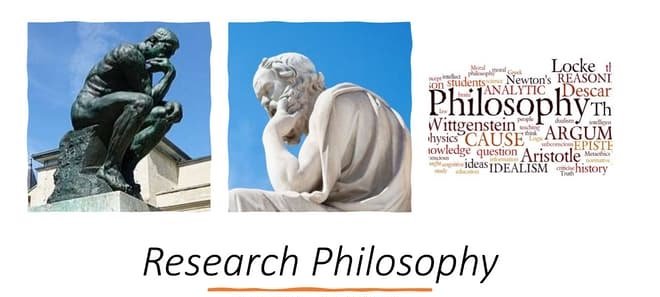When diving into academic research, one of the first and most important things you’ll encounter is the concept of research philosophy. But what exactly is a research philosophy? And why is it so crucial for researchers to choose one that aligns with their study? Let’s break it down, step by step, so you can navigate the different approaches with ease.
What Is a Research Philosophy?
Think of a research philosophy as the foundation of any study. It’s the set of beliefs and assumptions about how the world works and how we can gain knowledge about it. These beliefs guide how researchers collect and interpret data, and ultimately, how they draw conclusions. Without a clear research philosophy, your study could lack direction, leaving readers confused about how you reached your results.
Every researcher operates with some form of philosophy, whether they realize it or not. These underlying beliefs shape the approach they take. It’s a bit like choosing a map for a road trip – you need to know which direction you’re heading before you start your journey.
Positivism 101
Let’s kick things off with positivism, one of the most well-known research philosophies. Positivists believe in the idea that the world can be understood through objective observation. It’s all about gathering facts, analyzing numbers, and coming to conclusions based on concrete evidence. If you’ve ever heard the phrase “the numbers don’t lie,” that’s the positivist in action.
In this approach, researchers stay as neutral as possible. They believe that their personal biases should be kept out of the equation because they’re focused on observing reality in its purest form. This philosophy works best for studies where data can be measured and analyzed in a straightforward manner, like in the fields of science and economics.
Interpretivism 101
On the flip side, we have interpretivism. This approach couldn’t be more different from positivism. Where positivists see the world as something objective and measurable, interpretivists believe that reality is more complex. They argue that to truly understand the world, you need to take into account people’s unique experiences and perspectives.
Interpretivists often work in fields like sociology or anthropology, where human behavior and social interactions are key. They value qualitative data – things like interviews, case studies, and observations – because they provide deeper insight into human experiences that numbers alone can’t capture. In short, interpretivism is about understanding the world through the lens of personal experience.
Pragmatism 101
And then there’s pragmatism, the philosophy for researchers who don’t like to be boxed into one way of thinking. Pragmatists are all about flexibility. Instead of committing strictly to one paradigm, they blend elements from both positivism and interpretivism to find the best approach for their specific study.
The pragmatic approach is particularly useful in complex studies where a mix of quantitative and qualitative data is needed. Pragmatists believe in using whatever tools and methods will work best to answer the research question, without being tied down by a single philosophy. It’s all about practicality.

Choosing Your Research Philosophy
So, how do you decide which research philosophy to go with? Well, it all depends on the nature of your research and the questions you’re trying to answer. Choosing a research philosophy is a bit like picking the right pair of shoes for an event. If you’re running a marathon, you wouldn’t wear high heels, right? The same logic applies to research.
Let’s break down your options:
Paradigm 1: Positivism
If your study involves large amounts of data, hard numbers, and a focus on objective truth, positivism might be the way to go. Positivism is a great choice if you’re conducting experiments or statistical analyses, where it’s easy to measure and quantify results.
In this paradigm, researchers focus on creating structured methodologies, testing hypotheses, and drawing conclusions based on empirical evidence. If you like things clear-cut and straightforward, this could be your perfect fit.
Paradigm 2: Interpretivism
On the other hand, if your research involves exploring human behavior, understanding emotions, or interpreting social interactions, interpretivism is likely a better match. This philosophy suits research where the context and meaning behind people’s actions are just as important as the actions themselves.
Here, the researcher’s role is more hands-on. They engage with participants, analyze qualitative data, and provide interpretations of the findings. This is ideal for studies in psychology, sociology, or any area where understanding the “why” behind human actions is key.
Paradigm 3: Pragmatism
Finally, if neither positivism nor interpretivism seems like the right fit, you might want to explore pragmatism. As mentioned earlier, pragmatism allows for a more flexible approach, combining elements from both paradigms. This is particularly useful when your research requires a blend of numerical data and human experience.
Pragmatists don’t believe in following one strict path. Instead, they focus on what works best for their specific research goals. It’s the “jack-of-all-trades” approach to research philosophy, making it versatile and practical for complex studies.
Why Is Research Philosophy Important?
You might be wondering, “Why does this even matter? Can’t I just pick any approach and get on with it?” The answer is no. Choosing the right research philosophy is crucial because it impacts every stage of your research process. From how you collect data to how you interpret your findings, your philosophy shapes the entire study.
Not only that, but your research philosophy helps guide your readers. It tells them how you approached your research and why you chose the methods you did. In a way, it’s like setting the rules of the game. If your readers don’t understand your rules, they might not fully grasp the importance of your conclusions.
Read More: New Social Media Apps to Watch: 20 Innovative Platforms to Explore
Conclusion
So, there you have it – a breakdown of the main research philosophies: positivism, interpretivism, and pragmatism. Each has its own strengths, and the right one for you will depend on your research question, your goals, and the type of data you plan to work with.
Choosing a research philosophy is a bit like picking a lens through which to view the world. Do you prefer the clear-cut objectivity of positivism? The deep, human-focused insights of interpretivism? Or the flexible, practical approach of pragmatism? Whatever you choose, make sure it aligns with your research objectives and helps you provide clear, compelling results.
In the end, remember that there’s no one-size-fits-all approach. The beauty of research lies in its diversity, and the philosophy you choose will help shape the story you tell.







